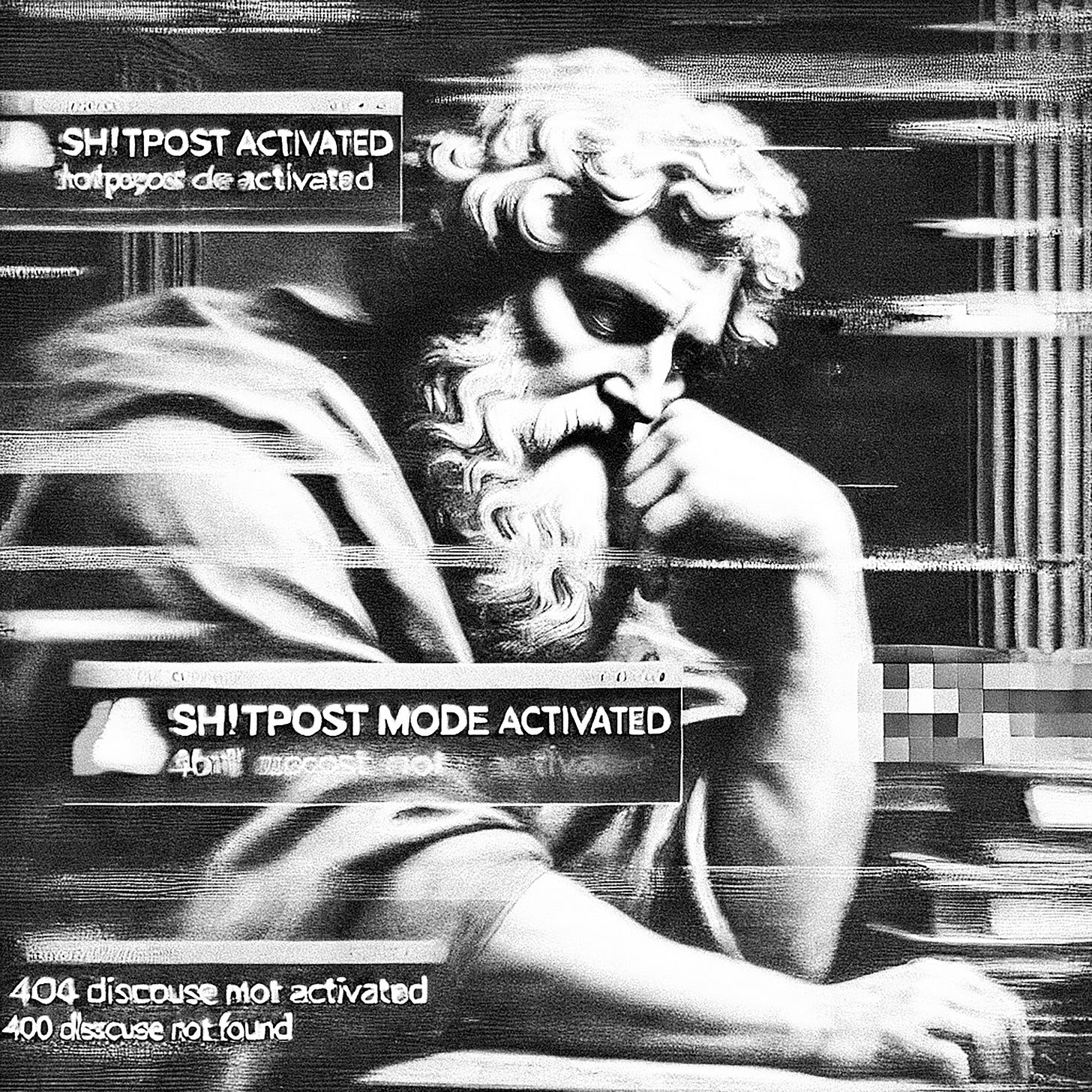Before I get into my thoughts on women and relationships, let me just say—I’m not talking about all women, or all men, or every situation, or every outlier no matter how small, no matter how unlikely, no matter how impossible, because, let’s be real, someone’s always ready to pull out that one tiny exception to try and shut down what I’m trying to say, which is…1
Now I forgot.
Dammit!
Give me a sec, it’ll come back to me…
What was I about to say?
What was my point before the whole thing got derailed because I had to preface it? Like I have to, because no one gets nuance or subtext anymore. Because most people are so chronically online, so deep in their bubbles, they can’t even fathom that their reality isn’t the reality. That their truth isn’t The Truth…2
You know what? I forgot what I was gonna say.
Guess it wasn’t that important.
Never mind.
Back to doomscrolling I go…3
See what I did there?
Anytime someone gets closer to The Truth instead of “my truth,” the person who doesn’t want that to be challenged will filibuster just enough to kill the momentum, just enough to derail the conversation so it dies a natural death—and their “my truth” can continue to go unchallenged in their little bubble.4
And here’s the kicker: I know I operate in a bubble—one that’s also my truth, masked as The Truth. But the difference is, I want to engage. I want to sharpen my thoughts. But I can’t, because every time I try to have a real discussion, every time I think I’ve found someone who might be a great adversary, and I try to engage, they turn out not to be.5
Because before we can spar, before we can even figure out how each of us thinks, the conversation gets killed off—filibustered into oblivion by bad-faith arguments.6
So what I do instead now is troll—and troll hard—because life is absurd, and it’s absurd to argue anymore. Because no one wants to be convinced the way I’d like to be convinced, to maybe grow, and I can’t get back the time I wasted prefacing my thoughts. So, the hell with it.7
I’ll just have fun with it now.
Instead of “living to the point of tears,” I’m shitposting.8

And yes, I’m toxic. Yes, I’m a misogynist or a misandrist or any -ist you—the rhetorical you—want to slap on as a label because of your need to categorize something into virtuous versus problematic thoughts.9
Now, what’s your next level to that?
If you’d like to read a story filled with problematic characters, check out my novel The Desert Road of Night, now available on Amazon and most major retailers.
The necessity of disclaimers in modern discourse stems from a culture that prioritizes individual exceptions over general truths, often as a way to dismiss broader points rather than engage with them. See Jonathan Haidt, The Coddling of the American Mind (New York: Penguin Press, 2018).
The erosion of nuance in public discourse is linked to social media, where binary thinking is rewarded. For analysis on this phenomenon, see Nicholas Carr, The Shallows: What the Internet Is Doing to Our Brains (New York: W.W. Norton & Company, 2010).
“Doomscrolling” refers to compulsive consumption of negative online content, reinforced by algorithms that prioritize outrage. See Richard Seymour, The Twittering Machine (London: Verso Books, 2019).
Filibustering in conversation is a rhetorical strategy meant to stall rather than engage in good-faith discussion. For more on this, see Deborah Tannen, The Argument Culture: Stopping America's War of Words (New York: Ballantine Books, 1998).
A strong intellectual adversary engages in dialectic rather than shutting down discourse. See Christopher Hitchens, Letters to a Young Contrarian (New York: Basic Books, 2001).
The death of debate through frustration is a method of controlling the narrative by making engagement unbearable. See Eric Hoffer, The True Believer: Thoughts on the Nature of Mass Movements (New York: Harper & Row, 1951).
Troll culture is both a response to and a weapon against the modern attention economy. See Whitney Phillips, This Is Why We Can’t Have Nice Things: Mapping the Relationship Between Online Trolling and Mainstream Culture (Cambridge, MA: MIT Press, 2015).
Albert Camus wrote, “To live to the point of tears.” This phrase, found in Notebooks 1935–1942, reflects his philosophy of embracing life fully, with all its beauty and suffering. See Albert Camus, Notebooks 1935–1942, trans. Philip Thody (New York: Marlowe & Company, 1998), 112.
The compulsion to categorize discourse into “acceptable” and “problematic” stems from ideological rigidity. See John McWhorter, Woke Racism: How a New Religion Has Betrayed Black America (New York: Portfolio, 2021).




